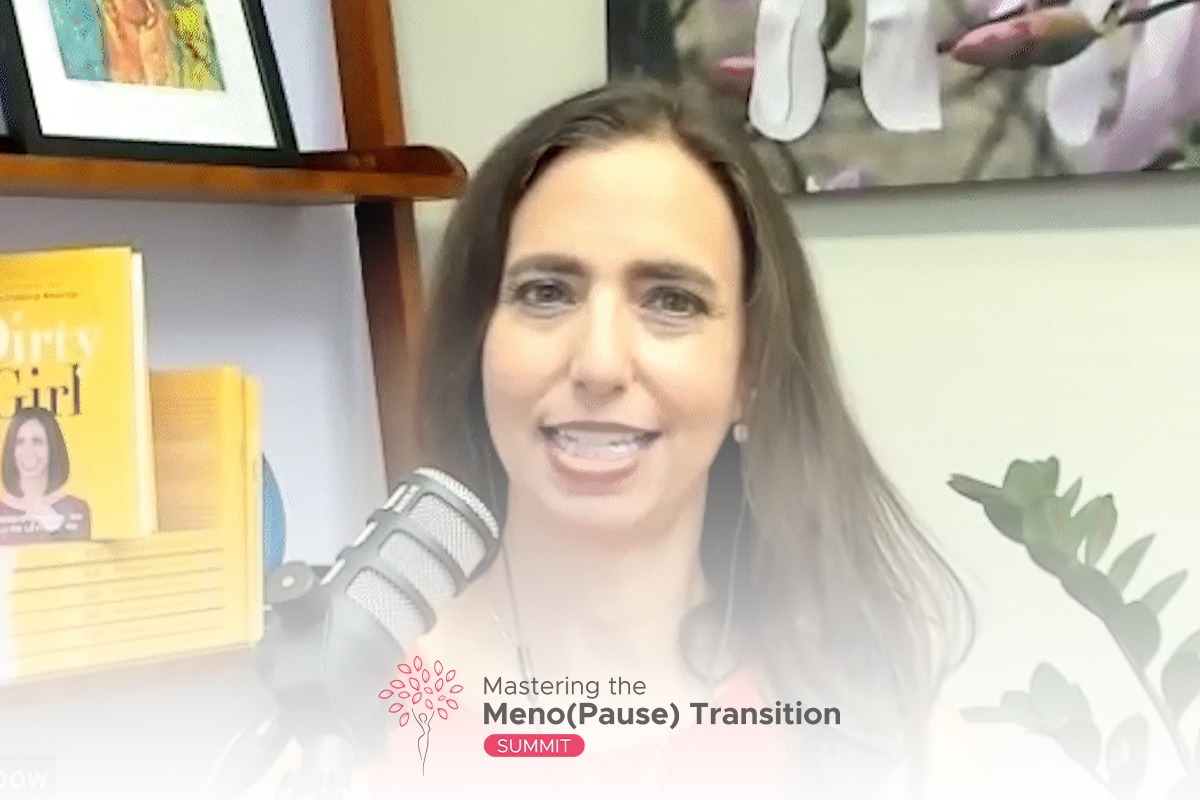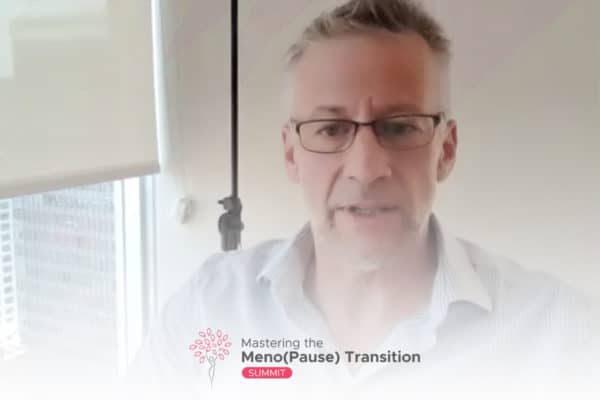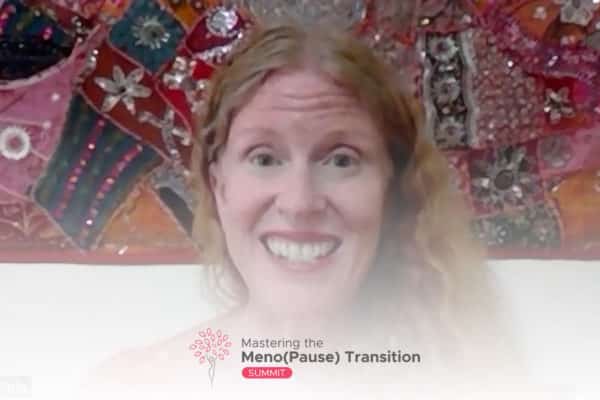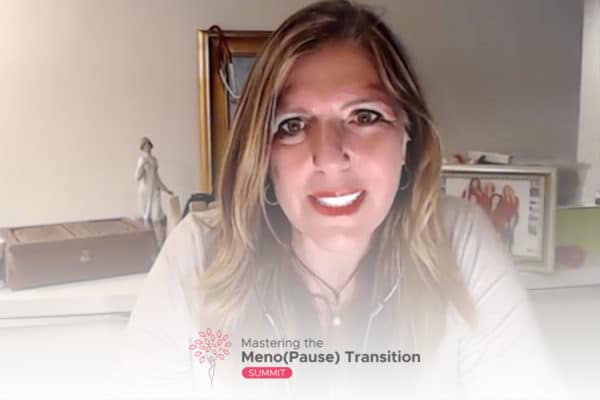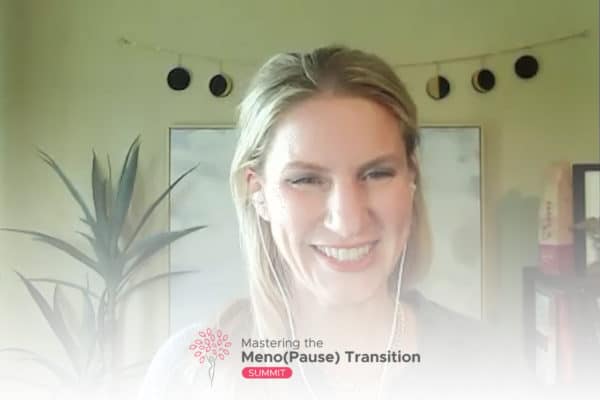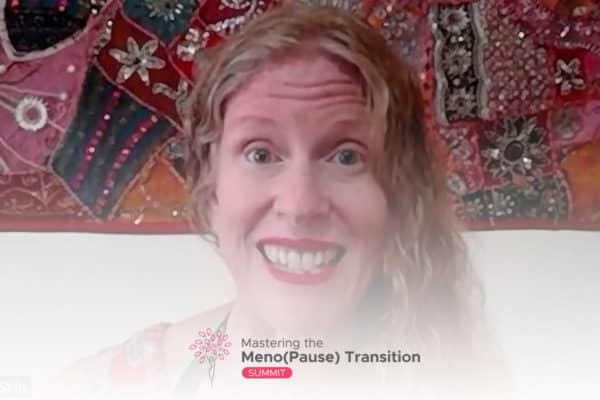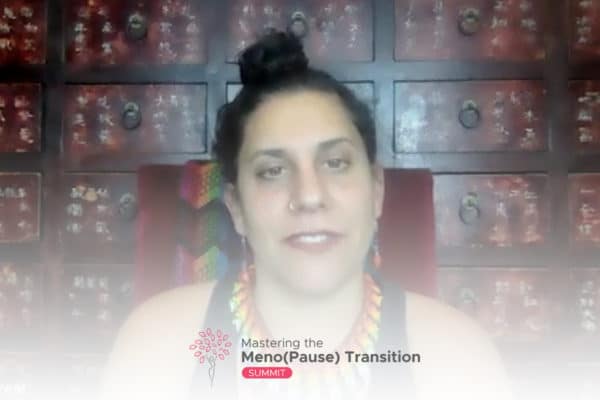Join the discussion below
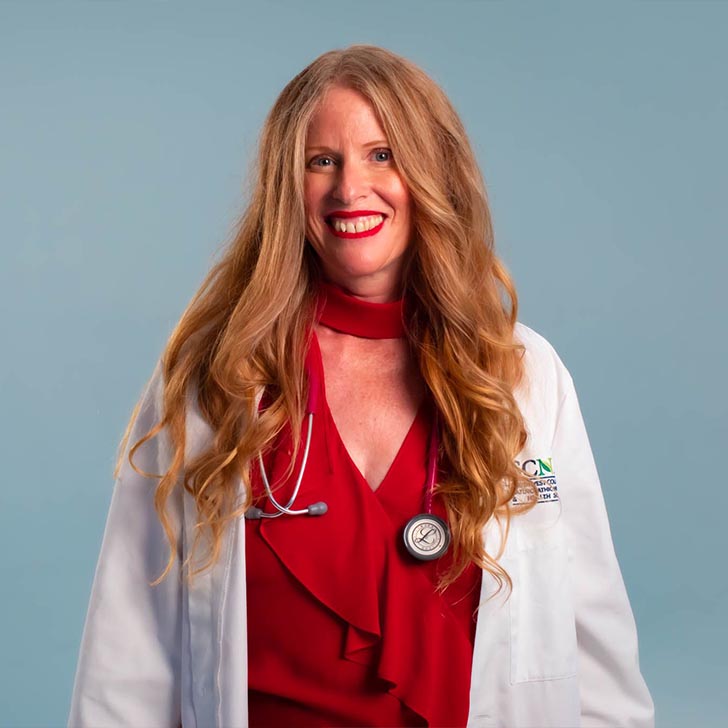
Dr. Sharon Stills, a licensed Naturopathic Medical Doctor with over two decades of dedicated service in transforming women’s health has been a guiding light for perimenopausal and menopausal women, empowering them to reinvent, explore, and rediscover their vitality and zest for life. Her pioneering RED Hot Sexy Meno(pause) Program encapsulates... Read More

Wendie Trubow, MD, MBA, IFMCP is a functional medicine gynecologist with a thriving practice at Five Journeys, and is passionate about helping women optimize their health and lives. Through her struggles with mold and metal toxicity, Celiac disease, and other health issues, Dr. Trubow has developed a deep sense of... Read More
- As a woman transitions into menopause, the adrenals do the work of producing female hormones
- The health of the adrenals directly determines the experience a woman has in this transition
- Toxins negatively impact the function and ability of the adrenals to do this work
Dr. Sharon Stills
Hello, hello, welcome back to “Mastering the Menopause Transition Summit.” I’m still your host, Dr. Sharon Stills, and it’s still wonderful to see you all here. This has just been so exciting, so informative, so loving and so inspiring. And today we are gonna follow with that. We’re gonna have a great talk with my guest. We’re gonna talk about the very important adrenal glands and how they relate to your hormonal journey. We’re gonna talk about toxins because unfortunately, toxins are everywhere. We no longer say, “Are you toxic?” It’s, “How are you handling the toxins that are coming at you?” It is just the reality of the world we live in. So I’m excited to have this conversation with my special guest, Dr. Wendie Trubow. She is passionate about helping women optimize their health and lives as a functional medicine gynecologist. Through her own struggles with mold and metal toxicity, celiac disease, and other health issues, she has developed a deep sense of compassion and expertise for what her patients are facing. She’s the co-author of “Dirty Girl,” which I see right there, beautiful book, “Ditch the Toxins, Look Great, and Feel Freaking Amazing.” I love that title. Welcome, Wendie. It’s nice to have share.
Wendie Trubow, MD, MBA
It’s great to be here, Sharon. I’m so excited to talk about this today, honestly.
Dr. Sharon Stills
Me too. Me too. And I’d love to start with just your journey. I think so many of us physicians, healers, we have our own journey and that’s how we get into serving patients in this way. So if you’d share your journey, I’d love it.
Wendie Trubow, MD, MBA
I’d love to do that. Someone said to me once, “Is your mess your message?” And I said, “Oh, totally.” My mess became my message. So my story really has two peaks. The first peak is characterized having terrible genes, really terrible genes, worst two copies of all the bad stuff, including two copies for celiac disease, two copies for MTHFR mutations, two copies for vitamin D deficiency. Like right there, that’s all the bad stuff. And then layering that onto epigenetics, the forces that occurred from my parents and grandparents. We were all immigrants. They were all super stressed. That causes genes to express themselves in ways that they might not have if they weren’t turned on and agitated. And then layered on I’m a child of the 70s, and I ate lots of sloppy Joe’s, and then 80s and my God, all the microwave food in the plastic. And then I decided that I had to contribute to the world by going to med school. I didn’t just wanna be a family doctor.
I had to be an OB GYN, which was like in my mind, really hard. I had to do something hard. And so I spent a long time essentially bombarding my poor little adrenals with stressor after stressor after stressor. So my first peak of my health breakdown mess occurred when I was 35 and I got diagnosed with celiac disease. And at that point I was pretty much barely functioning. So head to toe, brain fog, hair loss, anxiety, thyroid dysfunction, heart palpitations, bloating, gas, diarrhea, constipation, all on the same day, depending on the hour. Difficulty with fertility, my bones hurt, and I was wasting, and I had nutritional deficiencies up the wazoo. So that was peak one. I was 35, I got diagnosed with celiac, and that was my entry into functional medicine. And I was like, “Oh, this is the coolest thing since sliced bread,” right? ‘Cause I was a conventional OB GYN for that. So delivering babies, doing surgery, delivering babies, doing surgery, you know, rinse, wash, repeat. And when this happened, it really opened my eyes to that there’s a different way that I could contribute. And that started the second part of my career where I then transitioned into functional medicine. Fast forward, and then do all this work on myself, okay.
We’ll talk about the importance of adrenals in menopause, but I knew at 35, when I learned what a mess I was, I knew that my transition into menopause would not be good if I couldn’t get a handle on my adrenals. And then I had done a really good job stomping all over them and we needed to build them up. So let’s set that to the side. Fast forward 13, 14 years, and I am now perimenopausal. I go on the trip of a lifetime to France. We walk around for a week. I come home, I gain almost 10 pounds. Not in France, but when I came home from France, I gained almost 10 pounds. I had a rash on my face that would not quit. My brain wasn’t working. I was tired. And my hair started falling out in droves, like droves, You know, you shower and you’re like . I started counting hairs, and I said to my hairdresser, “It’s like 100 hairs just in the shower.” And she goes, “Yeah, that’s too much. You should lose like 20 to 40 in the shower. And then the rest throughout the day.” And I was like . And I originally chalked it up to perimenopause. I was 48, and I was like, “God, perimenopause is a beast.” But it wasn’t perimenopause, it was toxins. And because we live in a toxic world, when we went to France, the reason I shared that about France is we went to France right after Notre Dame burned.
And when Notre Dame burned, it released 500 pounds of lead dust into the environment, and the closer you were to Notre Dame, the more lead you got, and the farther way, obviously the less you got, but we spent a week right there. And that’s when I went off the cliff, I had a huge exposure to lead. It took me a few months to figure it out, Sharon. I was like, “What’s going on?” You know, first I checked my adrenals, they looked pretty good. And then I checked my thyroid, it was perfect. I never had such a perfect thyroid. And then I checked my hormones, they looked amazing, didn’t look perimenopausal. And then fast forward a few months, I learned about these toxins. And then I did the research and found, “Oh, oh my goodness.” You know, the impact on my body has been profound. And I figured out I had all these toxins. And so then I started to work on removing them, and I’ve spent the last three years actively getting them out of my body. I happen to be a very loyal repository for all the toxins. You know, I’m loyal to them, have terrible detox. That’s that MTHFR thing. And so I’ve been working on how do I optimize my body for peak performance and longevity? That’s been the focus and that’s what I’ve been working on.
Dr. Sharon Stills
Wow.
Wendie Trubow, MD, MBA
And by the way, I lost more than I had gained, ’cause everyone cares about how they look, and how they feel and their weight. You know, what do women care about? Our hair, our skin and our weight. Well, I had checked all three boxes for dysfunction. My hair is growing back, I lost more than I had gained, and my skin is cleared up. Phew.
Dr. Sharon Stills
Yeah, I was gonna say you… This must been prior, not just last month, ’cause you look great, so that’s inspiring.
Wendie Trubow, MD, MBA
Thank you.
Dr. Sharon Stills
Wow, how interesting about the fire from Notre Dame. Just a reminder, we don’t even always think about these things that we’re exposed to and what they’re giving to us. And yes, there are some of us who are loyal and who don’t detox, I like how you put that, who hold onto toxins more. And its like I said in the beginning, it’s really not about how toxic are you, it’s what are you doing with the toxins you’re exposed to. Because I’m sure there were some people who were near Notre Dame and their body just processed it out, and they went along their way and they were fine. So we have a lot to talk about. Let’s see, should we, should we do adrenals or toxins or both at the same time?
Wendie Trubow, MD, MBA
Yeah, I think we wanna set the stage, right? So I think we should talk about adrenals and how important they are to women’s health in menopause. And then talk about how important toxins are to appropriate adrenal health.
Dr. Sharon Stills
Okay.
Wendie Trubow, MD, MBA
And sort of walk our way through that path. That would be–
Dr. Sharon Stills
Yeah. Tell us what we need to know about the adrenals.
Wendie Trubow, MD, MBA
All right. So when you think about the transition from being a woman who menstruates and is of reproductive age to being a woman who doesn’t menstruate and is no longer of reproductive age. A, that’s a transition I always talk to my patients about honoring, right, ’cause you go, you really… It is a different phase in life. So honoring that you’re going through a different phase is really important. But when your ovaries stop producing the levels of estrogens that they do, there’s a void and you think, “Okay, well what’s gonna fill that void?” Well, as you transition into menopause, your adrenals fulfill that void. So your adrenals are these little glands. They’re like walnuts. They sit right on top of your kidneys in your back. And they’re responsible for your fight, flight or freeze, which is life or death, cortisol, cortisone, run away from a lion. And they’re also responsible for your hormone pathway when you’re in menopause.
Now here’s the bad news. Here’s the good news. Which do we want first? Let’s do bad news first. Bad news is fight, flight or freeze is going to be what your body always maintains over hormone balance. Think about it like getting out of the way of that lion that’s running after you, that your body thinks is running after you, is life or death. Hormone balance is nice to have. You’re gonna sacrifice nice-to-have hormone balance for, “Oh my goodness, I gotta get out of the way of the lion.” Now, Sharon, most people say to me, “I’m not that stressed. Oh, I just pushed out my earphone flipping my hair about how unstressed I was.” So people are like, “I’m not that stressed. It’s just the normal thing.” I said, “Your brain might not think you’re that stressed, but your body thinks you’re stressed.” So it’s really important to not just think about how your brain is interpreting it, but what is happening at the cellular level. Because being stressed about your kids, your job, your boss, not sleeping as you make this transition into menopause, not feeling yourself, all those things act as little stressors on the adrenals and the adrenals get diverted to maintaining what it thinks is a life or death situation, even though it’s not. The body has no other way to interpret it. Okay.
Dr. Sharon Stills
Very true. Very true. We have turned emails and–
Wendie Trubow, MD, MBA
Yes.
Dr. Sharon Stills
Prepping our shows or whatever into stresses. And so–
Wendie Trubow, MD, MBA
Yes.
Dr. Sharon Stills
And stress comes. It’s not just the mental stress. It’s the physical stress. It’s the chemical stress. It’s emotional stress. There’s so many different ways that stress joins us on our journey.
Wendie Trubow, MD, MBA
Exactly, right, it’s an unwelcome passenger. It’s a parasite. So the problem is that at the cellular level, your body can’t distinguish stress because you’ve a bad boss, or stress because you are late for something, from stress because you’re gonna get hit by a bus or a lion’s gonna eat ya. It’s all the same reaction. And so now if you go back to, as you’re transitioning from the woman who menstruates and the ovaries are producing, all the hormones to the ovaries are coming to their quiet time of life, your adrenals need to pick that slack up. And if your adrenals are stressed, they’re like, “I’m busy, buddy,” right? “Don’t bug me. I’m busy. I’m busy ’cause you’re about to get eaten. And if you die, then who cares if your hormones are balanced.” So it’s all about priorities to your adrenals. And the adrenals are really powerful. So let’s talk about some of the things that you can have. ‘Cause, you know, everyone sits in my office and says, “I have a thyroid problem.” And I’m like, “Well you might, but you probably have an adrenal problem,” ’cause they’re gonna run the show. So if you say to me, “My sleep is disrupted. I can’t fall asleep. I can’t stay asleep.” Or, “I always wake up in the middle of the night.” I’m gonna say to you, “You have an adrenal problem.” If you say to me, “I have night sweats.” I always wanna know, “Do you have day sweats too? Because if you only have night sweats, you have an adrenal problem.”
People are like, “My hormones.” I’m like, “Yeah, it is your hormones, but it’s your adrenal hormones, not your female hormones. Let’s keep them distinguished here.” And then if you say to me, “I can’t lose any weight.” I’m gonna say to you, “It’s probably not your thyroid. It’s either toxins, or your gut, or your adrenals.” And so since we’re on the topic of adrenals, if your body is in fight, flight or freeze all the time, that sends a message to your liver. A, it says, “Liver, lion’s coming, do not do detox. Focus on taking the sugar that you stored in the liver out. Put it in the bloodstream ’cause we gotta run. We are about to have to run and put that sugar in our muscles, like our leg muscles.” It also says to the guy… guys, digestion’s not a priority right now, because remember there’s a lion chasing us or a bus about to hit us. So shut down for a little bit. We need to preserve our energy to run, okay? All these things are happening in the background. And you can set yourself on this path if, for example, like a car. Two cars ahead of us a couple years ago swerved into the lane next to us. And I looked at my husband. I was like, “Put your brakes on,” because I knew that the car ahead of us was gonna swerve into our lane from the car swerving into them. And I was like, “Oh my God, we’re gonna total our car.” I had this thought, “We’re gonna get an accident. We’re gonna total our car. Brake, brake, brake.” It took me two days to recover from that little we-didn’t-get-in-an-accident incident. He braked, nobody hit us. Nobody hit us from behind. We didn’t hit the side rail. The car next to us went in front of us. We didn’t get in an accident. But I still put the system into drive, right. You can tank the system just from a stressful experience’s thought. Before I keep going, anything that you wanna unpack in that before we keep, ’cause there so much, right?
Dr. Sharon Stills
Yeah, no, and that is so much of stress starts in our brain, right?
Wendie Trubow, MD, MBA
Yes.
Dr. Sharon Stills
It start in our thoughts. We get anxious about things. I always say that’s a waste of our imagination because often the things we stress about don’t occur. It’s something that hits you from the side that you weren’t even thinking about that’s gonna be a stress. And so learning to modulate our thoughts through mindfulness, through breathing, is such a gift to our overall health, and certainly our adrenals, because we have such an epidemic of adrenal dysfunction. And I love that you brought up because it is true. Somehow thyroid has gotten a lot of press.
Wendie Trubow, MD, MBA
And it might be, right? Like, it might be.
Dr. Sharon Stills
Right. But you know, I won’t even work on a thyroid until we look at the adrenals, because you can just further deplete the adrenals if you haven’t supported them and you start revving the thyroid. And so I’m glad we’re putting adrenals where it belongs in this talk. I mean, I know I too trashed my adrenals. I used to think when I was going through school when I was younger and raising my kids and it was like, I got a badge of honor, ’cause I could function on four hours of sleep and do everything I had to do. You know, you’re robbing Peter to pay Paul. I was having this conversation with my 31-year-old son the other day, ’cause he was saying he only sleeps like six hours, and sometimes he even can only sleep four and he’s fine. I’m like, “You’re fine now, but it’s gonna catch up to you.” And so if you’re listening, there’s been quite a number of talks where I’m like, “If you’re listening and your menopausal, share this with the younger people in your life because we can really help by prevention. And if we understand this at a younger age, it helps us as we transition.
Wendie Trubow, MD, MBA
Well, think about it. When you think about aging, aging is the end result of dysfunction. So when you talk to your son, the conversation is not even that it’s not harming you now, it actually is harming you at a mitochondrial and telomere level, ’cause think about when you reproduce your DNA, the telomeres are essentially the caps to keep your DNA from unraveling. And every time your DNA reproduces, it gets shorter and shorter and shorter, and you die when it gets too short to protect the DNA. So stress, not sleeping, stresses the mitochondria separate, and stresses the telomere because you’re not adequately resting and rejuvenating. So I would say it’s actually impacting you now. You just can’t see the impact of it. You’ll see the impact of it in 20 years, but really it’s impacting you now.
Dr. Sharon Stills
Exactly.
Wendie Trubow, MD, MBA
So, it’s critical.
Dr. Sharon Stills
They just don’t feel it’s impacting them, right, because they’re young.
Wendie Trubow, MD, MBA
Yeah.
Dr. Sharon Stills
They can do anything. But that’s not really… So I learned by the time I hit my 30s it was like, all right, everything I have done up until now has really trashed, and now I gotta rebuild. But because I rebuilt, I had a beautiful menopausal transition. My claim is I’ve never even had a hot flash. It just–
Wendie Trubow, MD, MBA
Wow.
Dr. Sharon Stills
Flowed so beautifully because I really pre-gamed. And so some of you may not be in the pre-game place here. You may be further down the line and that’s fine. But if you know someone who you can share this with for them to pre-game, that’s a beautiful gift you can give to that person, and just to our society as a whole, because we need a healthy, younger generation. And right now they’re being bombarded with toxins, and invisible toxins and EMFs. It’s a little scary on a health level what’s going on out there.
Wendie Trubow, MD, MBA
Yeah, it’s horrifying. And I would even say if you’re in the midst of the transition now, I mean I’m in the transition now, and I will say, it’s so funny. I was at the osteopath this morning and he said to me, “How you feeling?” I said, “I am not right. I am just not myself. I’m fatigued. I’m having some sleep disturbances. And I’m having a lot more hot flashes both day and night. Not just night sweats.” And normally, I mean, I could go weeks without having a hot flash. but the last two weeks, I’m like, “God, I’m having six to eight hot flashes a day.” They’re not bad. They last for like 30 seconds. I get a little warm. I’m like, “Okay.” You know, I just do that and then they’re done. But it’s not normal for me. And it all, put together in the package, it’s not normal, common is not normal. So I think what’s really important is if you’re in the transition right now, and you have this expectation like, “Oh, well my mom had a horrific transition, so I’m gonna.” No, not true. You’re not your mom. We know more than we did and don’t accept, “Oh, I’m just stuck with this,” ’cause even if you didn’t pre-game, you can impact it now. He does this magical stuff with me and he is like, “Okay, you’re blocked here, you’re blocked here.
You’re pilot light’s low.” And I’m like, “Okay, but I feel better.” You know? Right. So there are ways that you can impact it. And if you’re listening, what can you do? One, cut out alcohol, super toxic for the adrenals. It’s very stressful, and it makes your transition into menopause worse. Think about it. Alcohol is a straight up toxin. Two, try to get into bed by 10, 10:30 every night and get off the screens. Don’t have screens in your bed. Bed is for sex and sleep, that’s it. Bed is not for watching TV. It’s bad for you. Three, avoid sugar, ’cause that stresses the adrenals, and then the adrenals throw off the whole endocrine system. Four, Epsom salt baths, super cheap, restores the energy, helps with the electrical pathways in the body. You can do that in your house. You can do a foot bath if it’s too hot, or a cold foot bath. If you’re like in menopause and you don’t wanna get in a bath, you can do a cold foot bath. If you’re willing to get in a sauna, get in a sauna, even if it’s hot. So there’s a million things you can do, right? And then you can also support the adrenal specifically with adaptogens. This is where I recommend getting in with a functional medicine provider so that you can really target what do you need. But there’s so many ways to help your adrenals so that you do have a better transition right now, not someday in the future, now.
Dr. Sharon Stills
So for someone listening, who’s like, “How do I know if my adrenals are messed up?” What would you say? How do you like to diagnose that?
Wendie Trubow, MD, MBA
So if you have any of the complaints of, “I’m having a really difficult transition from premenopause,” and then… I’m not sure, I’m assuming you’ve covered this, but let’s just go basic, right? So you’re of normal reproductive age, and officially perimenopause starts at 45. Perimenopause is the period where you’re transitioning from being fertile and having regular periods to not having any periods. There’s an interim period. It can last seven to 10, even up to 10 years for some women. And it’s characterized by fluctuations in your hormones, inconsistent ovulation. That means your fertility is starting to decrease. The ovarian reserve is decreasing, and all of these things are happening, and that can have a consequence on your sleep, your mood, your brain function, your weight, your gut. So if you’re in the perimenopause, or you’re now postmenopausal, meaning you haven’t had a period for over a year… I always feel like it’s a little squishy, right, ’cause you could go 13 months.
Do you need a workup for cancer? Probably not. It’s probably just, you know, last gasp ovary saying like, “Don’t forget about me. I’m still here before I go into quiescent sleep.” But anyway, if you’re having any of these symptoms, like you’re not sleeping properly, and that’s anything. Now, if you’ve never been a good sleeper, it’s hard to gauge. It’s a change. If you’ve had some kind of change, night sweats, day sweats, hot flashes, weight changes, skin changes, sex drive, difficulty orgasming, difficulty responding. It is very common to have difficulty getting as lubricated as you’d like. You know, as women, we need more foreplay. Men get an erection, they’re ready for sex. We actually have to work up to it. So it can take 20 to 30 minutes of foreplay before we’re actually ready to have sex. The vagina lengthens, you get lubricated. It’s not really just like flicking a switch as it is for men, you know, then it’s like on/off. We’re like, we have a dimmer switch. So if you’re experiencing any of those, did I mention difficulty losing weight? I think I did.
Dr. Sharon Stills
Oh yeah.
Wendie Trubow, MD, MBA
Yeah. If your hair’s not right, really anything. head to toe, if you’re like, “I’m different,” you wanna start to look at what do my adrenals need? You can fix your hormone levels, but that’s not gonna fix your adrenals. So if you keep abusing them, you’re gonna keep falling in the same pit over and over. So the goal is interrupt it, set you on a different path and trajectory so that you can go, “Okay, I don’t need as much.” Start to peel it off. Use less, do less, have fewer symptoms, feel better.
Dr. Sharon Stills
Hm, yeah. Adrenal support. There’s you know, from bioidentical cortisol to ashwagandha, to vitamin C, to B5. But I always tell my patients, “These things I’m gonna give you and they’re helpful. But the way we heal our adrenals is through our lifestyle choices.” You take all the herbs and supplements you want, but if you’re not doing the things you said and really doing less, finding your passion, prioritizing sleep, et cetera, you’re not gonna have the beneficial effects like if you do it all.
Wendie Trubow, MD, MBA
You say it so nicely, Sharon. I say to people, “I have the best supplements, but if you abuse yourself, they’re not gonna work. So let’s make some changes.” But you’re super nice.
Dr. Sharon Stills
Not always.
Wendie Trubow, MD, MBA
You can’t abuse… Right? Supplements aren’t gonna help if you abuse yourself. You can’t abuse yourself. You have to make a change in the rat wheel. Either get off it, walk slower, change rat wheels, whatever. You can’t abuse yourself or it’s not gonna work.
Dr. Sharon Stills
I look at personally, I looked at it as a gift that I had trashed my adrenals because it really helps me to stay on the path, on a healthy path, on a good life choice where if maybe I hadn’t, I’d still be drinking or I’d still be staying up late. And so it really, your adrenals are not that forgiving. I stay up late one night and they’re like, “Oh, hello, did you forget? You’re supposed to go to be early.” And so they really keep you on the path of–
Wendie Trubow, MD, MBA
Yeah.
Dr. Sharon Stills
Making good lifestyle choices. How do you, do you use saliva testing to evaluate adrenal glands? Maybe you could just talk a little bit about-
Wendie Trubow, MD, MBA
I use both, I mean, here’s the thing. I never, ever, ever check cortisol in the blood because the minute you come at someone with a needle, they’re cortisol is gonna go up. So then you’re like, “What am I looking at?” So we do look at DHEA. We look at estrogen, estradiol, testosterone, progesterone, and pregnenolone through the blood. The pregnenolone is the starting block for cortisol, cortisone. It comes from cholesterol. So if your cholesterol’s too low, that’s not good either. We test that through the blood. DHEA is the downstream metabolite in the hormone balance pathway in the adrenal. So we check that to see like, you know, do you have the substrate? Do you have the building blocks to cook with? That’s a really totally, I totally mixed my metaphors. Do you have the… Do you have the ingredients to cook with, to make your hormones, if your DHEA is normal? And then we look at cortisol through the saliva, and we look throughout the day to see what’s happening. So depending on what the needs are, we’re looking either at blood or at saliva.
Dr. Sharon Stills
Right, I find so many women think they have high cortisol and that’s why they have belly fat, but I’m constantly checking diurnal rhythms in the saliva. You’d be surprised at how many women don’t have high cortisol, but they’ve actually burned out their cortisol.
Wendie Trubow, MD, MBA
Right.
Dr. Sharon Stills
And they’re flat lined, or they’re peaking at the wrong time. They’re low all day, and then, “Oop eight o’clock, let’s do a jig and clean the kitchen ’cause now I have all this energy,” ’cause they’re adrenal, the pituitary HPA accesses off. I believe it’s really important to check because a lot of the symptoms you’ve mentioned, they can happen with high cortisol, low cortisol, and if you’re not checking, you’re kind of just guessing.
Wendie Trubow, MD, MBA
Yeah, I always check.
Dr. Sharon Stills
No blood for that.
Wendie Trubow, MD, MBA
No.
Dr. Sharon Stills
Yep.
Wendie Trubow, MD, MBA
I always check. But I mean, you know, we will say… You and I have done this for a long time, right, so I can say to someone, “I’d be willing to bet that your cortisol’s low in the morning and high at night. Let’s get the data and while we’re waiting for the data, let’s make you feel better so that you come back for your follow up and we can tweak it instead of start from zero.” So I usually will boost people with adaptogens in the morning, depending on what they say, right. If they say to me, “I always have an anxiety attack at four o’clock.” I’m like, “Oh, well you’re cortisol is hugely spiking. Let’s quiet it down at two o’clock so that you don’t have that spike.” So it’s based on what’s happening with you. But we definitely treat people based on symptoms. And I like the data to back it up so we could play around.
Dr. Sharon Stills
Exactly.
Wendie Trubow, MD, MBA
But you can kinda tell. Adrenals, I love them.
Dr. Sharon Stills
Anything else about the adrenals before we kinda shift over to toxicity?
Wendie Trubow, MD, MBA
Yes, one last thing. You know, I always say to people, “Sex or stress, you can’t have them both.” If there are any men listening, you have a… Women too, but for men it’s much more obvious ’cause there’s… Men have a sex drive no matter what. And women’s sex drive will go down if we’re stressed. So men’s will too, it’s just a little more subtle. So you can either have healthy functioning adrenals and manage your stress. Or if you don’t, you’re gonna have a cortisol steal where you don’t make your estrogen, your testosterone, your progesterone. You’re gonna go right down that fight, flight or freeze pathway and shut down your drive, your weight loss, your brain function, your hair. You’re gonna shut it all down because you’re in fight, flight or freeze. So sex or stress is the essentially take-home message. You can’t have them both.
Dr. Sharon Stills
Yeah. So we see the theme here, ladies, right? Seems like I always get to squeeze in my stress as the root cause of 99.999% of–
Wendie Trubow, MD, MBA
Yeah.
Dr. Sharon Stills
Issues. So here we have it again how stress is affecting us, affecting our adrenals, robbing us of a good sex life, which is our birthright and something we should celebrate as women. And so thank you for shining light on the adrenals, and for women to have that in their consciousness that that’s something that needs to be addressed.
Wendie Trubow, MD, MBA
Yep.
Dr. Sharon Stills
So “Dirty Girl,” let’s talk about toxin.
Wendie Trubow, MD, MBA
Yes, ’cause toxins are a stressor. And now we’ve talked about all about how you have to coddle your adrenals, but if you have toxins on board, that stresses your adrenals and gums up all the machinery of your beautiful body and how it should work, right? It’s pretty horrifying Sharon, right, when you think about how many toxins are out there, so let’s put them in categories just so people can start to think like, “How am I getting exposed to them?” So there’s toxins. There’s three categories of toxins. There’s more, but I put them into three categories just ’cause I can keep track of it that way. Heavy metals, the big ones. Lead, that’s from lead pipes, living in a home that was built before 1978 or doing construction on it. Industrial processes. That’s the general ways you get exposed. Mercury, fish, heavy mercury fish like tuna, mahi-mahi, Chilean sea bass, swordfish. And then fillings, the silver fillings are high mercury. And also industrial processes, high fructose corn syrup. Because when you make high fructose corn syrup, you have to use mercury. So that, cadmium, which is found in west coast oysters at high levels, and also smoking. There’s more, but those are the big ones. Then there’s mycotoxins.
These are the toxins found in moldy buildings. These are mold toxins that when they get in your body, they put out toxins. It’s really creepy. So mycotoxins, moldy buildings, schools, dorms, buildings with water damage. I had a patient who had a car that was moldy. If you have a car that was in Hurricane Katrina that was submerged, your car is moldy. So you can get exposed in a lotta different ways. And also it makes you sick. And then we haven’t even talked about how it makes you sick. And then the last category is the other. It’s like a nice bucket for all the environmental stuff. So that’s industrial processes, living near a highway, living near a golf course, living near a non-organic farm, or a farm that sprays the products. We clean our house with the things that we’re putting on our body. Nail polish, makeup, hair products, dying our hair, the clothing we’re wearing, how we’re cleaning that clothing, all of the things. What bed are we sleeping on? What furniture are we using? All of those things around us, okay? Those are all toxins. And there are three ways that you could basically get it in you. You could ingest it. So that’s the food you’re eating if it’s not organic. If you’re having plastic water bottles, if you’re drinking alcohol, so you could put it in your body. You could put it on your body. That’s where the nail polish and beauty products come in. Or you could be around it. It could be in your air or water quality, or in your environment and you’re sleeping on it, you’re lying on it, you’re hanging out on it. So a lot of ways to get exposed.
Dr. Sharon Stills
Yes there are. That other bucket is ginormous, it’s huge. Also, for this population, we have to think about as we’re losing bone, that is where those of us that grew up in the 60s, the 70s, the 50s, there was a lot of lead. And so as we’re losing bone, we’re exposing ourselves to the lead that we have stored there. So it’s really important that you have a heavy metal consciousness and program as you’re also working on your bone health.
Wendie Trubow, MD, MBA
I would go so far as to say, if you were diagnosed with osteopenia or osteoporosis, that you need to look for metals, particularly lead, because it preferentially hangs out in your bones. So when you think about, “Well, what are the toxins doing to us?” Okay, big picture, they make us suffer. If you get enough of an exposure, it’ll kill you. But then there’s this stuff like, it just tortures you. So if you break a bone, it falls to me in the category of getting tortured because you gotta deal with it. So what are the consequences for pre, peri, and postmenopausal women? So bone health, brain health. These toxins are implicated in dementia, Alzheimer’s, Parkinson’s, all autoimmune diseases, degenerative diseases. Anything that causes you to fail slowly over time, toxins are implicated. Weight gain, diabetes, cardiovascular disease, anxiety, heart attacks. You could just kinda of keep going on and on. Cancers because they are the end result of inflammation gone awry, and toxins are a major source of inflammation, which is why they stress the adrenals to tie it all together. So when you look at toxins, osteoporosis, bad periods, bad transition into perimenopause, all these things, infertility, multiple pregnancy loss, all of these things can track back to toxins, which is the why it’s important. ‘Cause it not only can kill us, but it tortures us while it gets us there. That’s nothing any of us want.
Dr. Sharon Stills
No, it’s implicated in everything at this time of our existence. So what are some of the ways you look for toxins in patients and what are some of the things you can share with the ladies that they should know about that they can do to mitigate or .
Wendie Trubow, MD, MBA
Let’s put this in two categories. Let’s talk about first the things that you can do on your own to clean up your environment, clean up your life. What can you do without even needing someone like you or me, right? We put together, I think it’s part of the offering, we put together the promo, which allows you to… We put together all of the things that you can level up to for what are you gonna put in your… What are you gonna use for cooking? What are you gonna use for makeup? What are you gonna use for your bed if you’re buying a new bed? All the products that we recommend, because it could be kind of overwhelming when you look at transforming your life. It’s like, , there’s a lot to do, guys. We’ve boiled it down so that the listeners don’t have to. I would definitely go check out the promo at fivejourneys.com/promo, because that’s gonna help you as you transition through.
So that’s one. So there’s a ton of things you can do on your own. Clean up your food. Try to eat organic wherever possible so you’re not getting exposed to the herbicides, pesticides and insecticides that are on your food. That’s one. Try to avoid processed food because the processed food are grains. The grains have sat in bins, and if it rained, those grains are moldy. Hmm. So try to minimize the… Clean up the foods you’re putting in your body. Don’t drink alcohol. It’s bad for you. It’s a straight up toxin. It makes the liver divert to only dealing with that. And then it stresses the adrenals, rinse, wash, repeat, wash, rinse, repeat, like do the same thing over and over, so what we really wanna do is decrease the number of things you’re getting exposed to. So don’t drink alcohol. Minimize your sugar. These are all things you have control over. Move your body regularly and sweat so that you can get the toxins out. That’s either exercise, and/or Epsom salt baths, sauna, sauna blanket, sauna pods, doesn’t matter. Do something to sweat, dry brushing, do anything you can. Clean up your products that are around you. Again, this is where that guide’s gonna come in really helpful, ’cause it’s “The Non-Toxic Guide for Healthy Living.” That’s where it’s gonna come in very helpful. Clean up your makeup. Clean up the products you’re cleaning your house with. Clean up your laundry detergent. Clean up your toothpaste, your hair products, all of it, right?
And if you’re in the market for a new bed, you’re gonna wanna make sure you get a bed that doesn’t have flame retardants in it because those are major endocrine disruptors and your hormones are part of the endocrine system. Don’t just go buy a new bed unless you have the means to, but if you’re looking for a new bed, then I would get one, either Birch or Avocado. Those are the top brands. And think about it, you sleep on your bed for ideally eight hours a night. So you want not to be exposed to chemicals while you’re sleeping. So these are things you can do all on your own. Then there’s the next level, which is, “Hey, I’ve done all this stuff.” And maybe you’re like me where you’re kind of a loyal repository and you’re just not where you wanna be or you’re not as healthy as you think you could be. So then you wanna get into evaluation. And that’s where I say, “Okay, you need a seasoned functional medicine provider who’s going to look at the data and set you off on the path that will allow you to target what are you getting exposed to in the highest levels?” And consistently iterate on that path, ’cause it’s not like, “Oh, this is what I have, and it’s gonna be that way for 10 years.”
It’s like, “Here’s what I have today. And we’ll work on this for six months, then we should recheck it.” What we do is we do urine testing for heavy metals, and we do a provoked urine test. So we do two tests, baseline and a provoked test. That’s DMSA, and we’re using it to pull out the metals to see, “What are you storing in your bones?” That’s metals. And then for the mycotoxins, the environmental toxins, the herbicides, pesticides, gasoline fumes, all that, we’re doing another urine test that’s provoked with glutathione and a hot bath, which can sound kind of torturous if you’re premenopausal. But you know, when you get outta the bath, you’ll evaporate hopefully, and you’ll cool down, but a hot bath for 30 minutes. That’s two tests, and that gives us all the data that we really need, and then we start to prioritize. What’s the highest, what’s your… You know, if you just broke two bones, we’re gonna go for metals first, and particularly lead. If you have rashes and airway disease and can’t lose the weight, I might go for mycotoxins first. It just kind of depends. I mean, I had all of them, so I was just like, “Well, I’m such a mess. We’re gonna treat them all at once.” I couldn’t really prioritize ’cause I was such a mess.
Dr. Sharon Stills
Yeah, glutathione and sauna will handle a lot of things. It is a journey.
Wendie Trubow, MD, MBA
Yeah.
Dr. Sharon Stills
I always say detox is not a weekend or a five-day detox program. It’s a journey. And when you are provoking urine and you see what comes out, sometimes that’s the iceberg, sometimes more often, it’s the tip of the iceberg. And when you open up the emunctories, and you make sure that your detox pathways, and your skin, and your lymph, and your kidneys, and your lungs–
Wendie Trubow, MD, MBA
Um hmm.
Dr. Sharon Stills
Everything is open and you start gently guiding them out, often then the body’s like, “Oh okay, well now I can relax and I can release more.” And so it’s definitely something you wanna be guided through because there is a science and an art to it, for sure. And it’s something to take seriously because if you’re not detoxing properly, then you can just be moving toxins, And then you’re just retoxing rather than detoxing.
Wendie Trubow, MD, MBA
Well, think about it. You can get rid of about 1% of your mercury body burden every day. So if you think about the numbers, you go, “Okay, 1%, we wanna get to 100. So after just over three months, we, in theory could get rid of all the mercury in our body.” But there’s a wrinkle. We recycle 99% of what we’re putting in our gut to get rid of. Meaning, we really only get rid of .01%. I can never do this math. I think it’s .01 of a percent, a hundredth of a percent is what we’re getting rid of every day. And so that’s a big difference, right, because that assumes you’re not getting any further exposure. And so it’s really important to make sure your gut health is intact. It all ties together, right? It could be like… So it’s important that you have proper fiber in the gut and that your gut isn’t dysfunctional, that you’re pooping, you’re not constipated. You definitely would never wanna do detox if you’re constipated, ’cause then you’re gonna make yourself sicker ’cause it builds up in the gut. There’s all these layers, which is the argument for working with someone. You don’t wanna make yourself sicker. That’s not the goal. The goal is get it out and keep it out.
Dr. Sharon Stills
And you mentioned exposure. So you certainly wanna be looking at, you know, which is why we do the pre and post because sometimes we see, “Wow, you have this major exposure going on to nickel or aluminum or cadmium or gadolinium from testing you’ve had done.” And so we wanna be able to then put on our Sherlock Holme caps and figure out where you’re getting this exposure and stop it. And certainly with mercury, you need to take care of your teeth. You need to get those amalgams out. You don’t wanna be detoxing or even provoking and testing when you have a mouth full of amalgams. You wanna make sure you’re removing the dripping source, and then you can kinda see what’s going on there. It’s definitely… And I mean, I don’t know about you, but I test patients regularly and I no longer… You don’t see patients who don’t have toxicity. It’s just a matter of how bad is it? And it’s quite sad, even the labs. Some of the labs are like, “No, it’s okay if they have up to 75%. We’re just looking at 95% being a bad thing.” And I’m like, “No, no, no, no, no, no.”
Wendie Trubow, MD, MBA
Yeah.
Dr. Sharon Stills
It’s not OK. First of all, it all compounds on each other, so you got 25% here, and 50% in this one, and 75% in this one. But we wanna get that number as low as possible. And detox is a journey. It’s a lifestyle. It’s really something that if we want to be mastering our menopause transition, we have to be participating in.
Wendie Trubow, MD, MBA
Um hmm, it’s really pretty critical because it will influence the quality of your menopause. And you know, we talk about peak performance and longevity in our practice. When we say “longevity,” people here are living a really long time, but being decrepit. I don’t know why they hear that, but that’s what they hear. And what I’m always saying, “My goal is not only that you live long, but that you live optimally functioning and at the best performance that you’re able to do, not decrepit and sitting in a wheelchair without your brain. That is not the goal, okay. So the goal really is that your quality of life is amazing, that you feel good in your body, you have a sex drive. You’re like, ‘Oh, I feel good,’ right? ‘I feel good. I slept good.'”
Dr. Sharon Stills
This is our time of… we’re no longer losing our wisdom through our cycle. we’re retaining it. So this is our time of creativity. There’s so much life and experience to be had now. And yes, you can do it while feeling good. If you don’t have a healthy vessel, then nothing else really matters ’cause you can’t really enjoy… Even if you have all these wonderful things in your life, if you don’t feel good, you can’t appreciate and enjoy them. And so yes we are definitely talking about longevity and healthy, vibrant aging, absolutely.
Wendie Trubow, MD, MBA
100%, yeah.
Dr. Sharon Stills
Well thank you, thank you, thank you for discussing these important topics.
Wendie Trubow, MD, MBA
My pleasure.
Dr. Sharon Stills
I’ve really enjoyed it. So where can… You mentioned a guide. Can you just mention where we can find you again and learn more?
Wendie Trubow, MD, MBA
Yep. Yep, there’s lots of places. We have a guide on our website. It’s “The Non-Toxic Guide for Healthy Living.” It’s at fivejourneys.com/promo. And I believe your team has the link to it.
Dr. Sharon Stills
Yeah we’ll put–
Wendie Trubow, MD, MBA
And then–
Dr. Sharon Stills
Yeah.
Wendie Trubow, MD, MBA
Yeah. So that’ll go in there. And then I’m on Instagram at @wendietrubowmd, and my name is spelled funny, but I’m assuming you’ll put it all in there. And I’m also on Facebook at that same link. And so people can find me in those two places or three, I guess.
Dr. Sharon Stills
Great. Well thank you. Thank you for being here and–
Wendie Trubow, MD, MBA
Yeah, my pleasure.
Dr. Sharon Stills
For all the work you do in the world, and all the ladies you help. Everyone, this has been a… This has been a good one. This is some important stuff here. Adrenals and toxins, two very, very physiological important pieces we have to be paying attention to. So I hope you learned something. I know you did. If you didn’t, listen again. There’s a lot of juicy nuggets in here. So thanks for being here and I will see soon, bye.
Downloads

